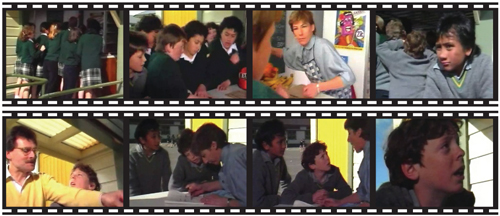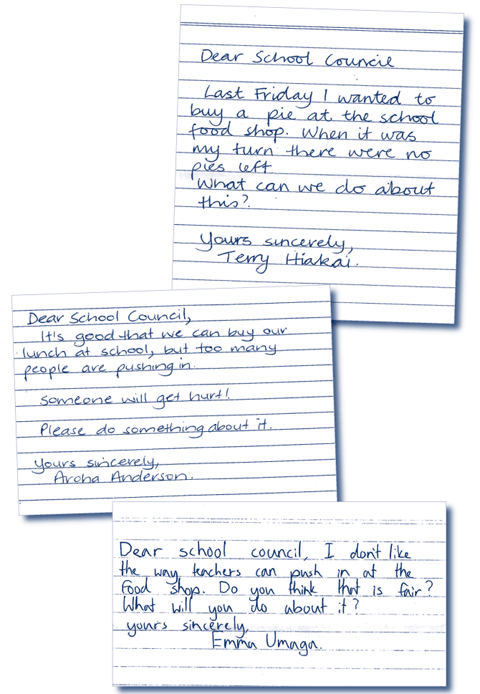| Approach: Team |
Level:
Year 8
|
 |
| Focus:
Addressing
organisational problems and developing rules |
| Resources:
Video recording
on laptop computer, 3 letters, answer sheet, agenda |
|
|
| Questions/instructions:
|

|
|
Morning
break at school; students crowded in around the canteen counter,
pushing to get to the front. Canteen manager is stressed and angry.
Terry makes it to the front of the queue and orders his lunch
but a teacher pushes in. The canteen manager is much more pleasant
to the teacher and forgets to record Terry’s order. Later
in the day during the lunch break, after finishing his class monitor’s
duties, Terry makes his way to the canteen to collect his pie.
The canteen manager tells him there are none left and insists
that he never placed an order. She checks her list and his name
and order are not recorded. She unfairly implies that it is Terry’s
fault and he is left with nothing to eat.
|
This
activity uses the computer.
We’ll start this activity by watching a short video
which shows that things are not going well at the school canteen.
Click the School Canteen button to start the video.
Some children have written letters to the school council complaining
about the canteen. Imagine that you people are the school
council, and you have been given the job of sorting out this
problem. You have four things to do, which are listed on this
card. I’ll read them through to you:
Show and read the agenda. |

|
| School
Canteen Meeting Agenda |
| 1. |
Read
the letters and decide on the problems. |
| 2. |
Talk
about how the problems could be fixed. |
| 3. |
Work
out how you could let other students at the school have
a say about how the problem should be fixed. |
| 4. |
Agree
on three good reasons why the council thinks there should
be some rules. |
|
During
your meeting, you will need to write down what you have decided.
At the end of the meeting I will act as a newspaper reporter.
I’ll ask you to tell me what you have decided for the
four things on the card. Each person in the team should help
to tell me about your decisions. You have about 10 minutes
for your meeting. Here are copies of letters to the school
council, and paper for writing down your meeting notes.
Give students copies of the letters and the answer
sheet.
Allow about 10 minutes for discussion.
Now imagine that I am a reporter for the school newspaper.
I’m going to interview the school council. I’ll
ask you to tell me about the four items on your card. You
are to take turns in telling me what you have decided. |
|
|
|
%
responses
2005 (01) |
| - |
y8 |
Involvement: |
all
members contributed substantially |
|
55
(51) |
| |
all
except one member contributed substantially |
|
38
(42) |
at
least two members did not contribute substantially |
|
7
(7) |
| Nature
of decision-making: |
most
decisions made by consensus |
|
40
(37) |
| |
some
decisions made by consensus, others by acquiescence
(agreeing without protest) |
|
57
(61) |
many
decisions left at least one member unhappy |
|
3
(2) |
| Rejection
of ideas and put-downs: |
no
unpleasant rejections |
|
90
(88) |
| |
one
or a few unpleasant rejections |
|
8
(12) |
quite
a lot of unpleasant rejections |
|
2
(0) |
| 1.
What were the problems at the canteen? |
|
|
How
many of these issues have been clearly identified in the answer:
|
|
|
–
orders not kept for people
– serving person not friendly
– people pushing in
– no good queueing arrangement
– teachers given priority/pushing in
– insufficient supply
|
|
|
| |
4–5
|
|
31
(39) |
2-3
|
|
67
(54) |
1
|
|
2
(5) |
none
|
|
0
(2) |
| 2.
How did you think the problems could be fixed? |
|
|
| |
good
ideas for most listed problems |
|
49
(47) |
good
ideas for 2-3 problems |
|
41
(41) |
good
ideas for 1 problem |
|
8
(10) |
no
good ideas for solutions |
|
2
(2) |
| 3.
How would you let the other students have a say about how the problems
should be fixed? |
|
|
Overall
merit of suggestions:
|
excellent/very
good |
|
15
(11) |
| |
good
|
|
20
(29) |
moderate
|
|
53
(48) |
poor
|
|
12
(12) |
| 4.
What are your 3 good reasons for having some rules? |
|
|
Overall
merit of set of reasons:
|
excellent/very
good |
|
21
(23) |
| |
good
|
|
22
(19) |
moderate
|
|
46
(51) |
poor
|
|
11
(7) |
Total score: |
10–12
|
|
21
(21) |
| |
8–9
|
|
27
(23) |
6–7
|
|
39
(42) |
4–5
|
|
10
(10) |
2–3
|
|
3
(4) |
0–1
|
|
0
(0) |

